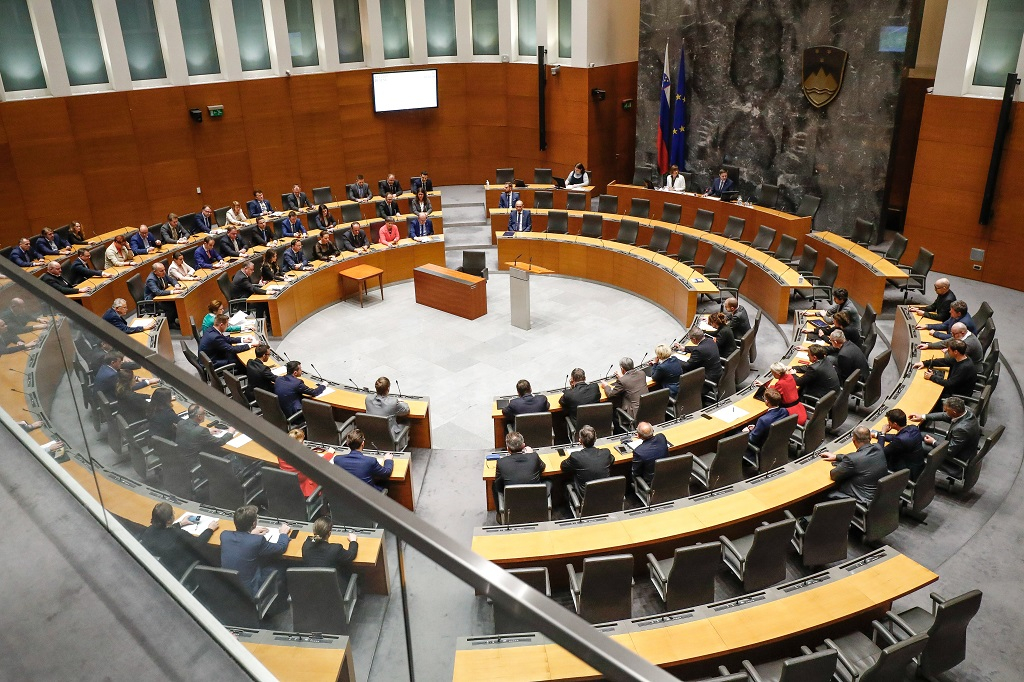Before the end of the year, the National Assembly held an extraordinary session at which the MPs will discuss the proposal of the 10th anti-corona act, which extends and introduces new measures in the field of health care and assistance to individuals and the economy. The MPs also decided on amendments to the VAT act, with which they want to transpose the provisions of several European directives into the Slovenian legal order. The National Assembly was expected to vote definitively on the appointment of members of the RTVS programming and supervisory board.
The National Assembly held an extraordinary session yesterday to discuss the bill on additional measures to prevent the spread, mitigate, control, recover and eliminate the consequences of covid-19, which will extend and introduce new measures in the field of health and help individuals and the economy.
The tenth anti-corona package envisages, among other things, a one-off solidarity supplement for pensioners with pensions of up to 714 euros, in the amount of 130, 230 or 300 euros. The law also provides an allowance for unpaid farmers over the age of 65, the disabled and war veterans, as well as a monthly allowance for members of the protection and rescue forces and for pupils and students who help care for patients in health or social care institutions. It also extends last year’s tourist vouchers, which will be valid until the end of June 2022.
The National Assembly’s Finance Committee approved the bill on Thursday, while SD, LMŠ, Levica and SAB MPs obstructed the vote. The latter allegedly did so because the chairman, Robert Polnar, a representative of the DeSUS parliamentary group, did not want to rule out business-inappropriate proposals for amendments. The Legislative and Legal Service of the National Assembly had numerous comments on the draft laws and amendments. It was also decided on the coalition’s amendment on the temporary increase of the highest salary grade for doctors and dentists from the 57th to the 63rd salary grade.
Prior to the adoption of the bill, Prime Minister Janez Janša pointed out that MPs and members of the government receive hundreds of messages by e-mail from false addresses, mostly opposing the adoption of the PKP10. “For several days now, hundreds of messages from fake addresses, known to KUL, have been coming to the e-mail addresses of members of the National Assembly and members of the government, mostly from just a few computers. They oppose PKP10, which brings allowances to pensioners and other vulnerable groups,” he wrote on Twitter, posting a few such examples.
The MPs were also faced with a proposal for an amendment to the Value Added Tax Act
At the last extraordinary session, it is also planned to decide on the proposed amendment to the Value Added Tax (VAT) Act. This is a new proposal prepared by the government after its proposal did not win a majority in the first reading of the National Assembly in July. With the amendment, they want to transpose the provisions of several European directives into the Slovenian legal order, among others in the field of VAT calculation in cross-border trade or e-commerce. In addition, it is proposed, inter alia, to abolish the threshold for compulsory entry of farmers into the VAT system from July 1st, 2022, eliminating the need to check the volume of cadastral income and taxable subsidies every year and consequently identify farmers for VAT ex officio.
It is also envisaged that the law would eliminate the VAT exemption on imports of insignificant value (VAT exemption for imports of up to 22 euros was abolished on July 1st this year with regulations) and that companies could claim a VAT deduction when purchasing electricity motor vehicles if these vehicles were intended to carry out the activities of the obligor. The proposal envisages that merchants and other issuers of invoices would deliver them in paper form only at the request of customers.
The National Assembly also decided on the members of the programming and supervisory board of RTV Slovenia
At yesterday’s extraordinary session, the MPs also decided on the appointment of members of the programme and supervisory board of the Radio Television of Slovenia (RTVS) as part of their mandate and election matters. The National Assembly should have decided on this at its regular session in December, but the President of the National Assembly Igor Zorčič did not vote on the decisions on the nomination of candidates proposed by political parties due to their incompatibility with the RTVS Act.
Five members should be appointed to the programme council on the proposal of political parties and eight members on the proposal of viewers and listeners, similarly five members should be appointed on the supervisory board on the proposal of political parties. The complication arose because the Mandate-Election Commission selected only SDS, NSi, SMC, DeSUS and SNS candidates as members of the Programme and Supervisory Board, while the RTVS Act stipulates that the National Assembly must consider the representation of parties in the National Assembly as much as possible when appointing to the Programme Council and must take this into account when appointing to the Supervisory Board. The coalition pointed out that the government of Marjan Šarec had started such a controversial practice, the opposition at the time warned of illegal conduct, but they did not take it into account and elected their representatives.
By: Sara Rančigaj /Nova24tv


